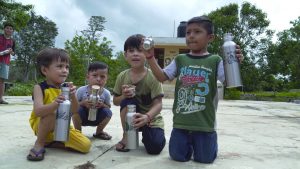Sustainable Synergies 2021
Welcoming in 2021! Here’s to another year filled with hope and opportunities to learn from the challenges we have faced over the past year.
“Together is better.” “Each of us matters.” “Every action counts.” Though each of these phrases resonate true to our purpose, they are often repeated to the point where they can feel cliche when we do not see immediate results. Our individual actions and motivational taglines can feel overshadowed by the hope and promises made by countries or large corporations claiming to solve our problems for us. However, as years pass and problems continue, we have learned that it is individuals and communities working together that truly drive change.
Over the past year, I have been deeply inspired by the passion and strength demonstrated by those who have remained steadfast in purpose during changing and challenging times. It is this unwavering commitment that continues to drive positive change, which we will undoubtedly see more of in 2021.
I want to personally send my deepest thanks to all that supported our efforts in 2020 and to those that continue to do so in this new year. Through your generosity – whether that came via a donation, volunteering or helping us spread our message – you have joined and greatly assisted our team in protecting our planet. You provided both hope and inspiration.
Though we cannot predict the hurdles that will develop along the way, we can and will learn, adapt and work together with the shared mission to end plastic pollution and foster sustainable communities around the globe.

These efforts include our BlueCommunities, Rethink.Refill., and Trees & Seas initiatives.
BlueCommunities is a project that allows us to truly follow our belief that we can and must act locally in order to inspire change on a global scale. We work with local communities by establishing long-term egalitarian partnerships to address the systems that affect plastic pollution.

Kids in Mexico proudly displaying their Rethink.Refill. water bottles.
Our Rethink.Refill. project empowers students to rethink plastic and water security for their schools and communities. Students participate in solutions that quantifiably eliminates single-use plastic bottles from the waste stream while addressing local potable water access.
The Trees & Seas project unites ocean and forest conservation. Plastic pollution is not just an oceans issue but a human health and climate issue. With almost 8% of the annual global oil consumption used for plastics and the high carbon-intensive activity of processing fossil-fuels, plastics also wreak havoc on climate change. This initiative highlights the strong connection between land and sea and the pervasive nature of plastic pollution to affect both. Trees & Seas both eliminates plastic waste from our waterways and offsets the carbon impact of plastic. We are excited to officially launch it in February.
With these initiatives we can achieve real change together. We are not only spreading words of inspiration and hope, we are engaging and working with communities on a shared mission to end plastic pollution and foster sustainable communities.
Julie Andersen is the Chief Executive Officer of Plastic Oceans International. Her career has focused on communicating new means to improve and safeguard human health and the environment from the negative effects of industrial development. She has worked in public health and nonprofit management internationally for the past 15 years.
